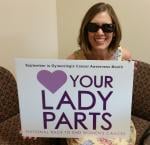The Cancer Survivors Network (CSN) is a peer support community for cancer patients, survivors, caregivers, families, and friends! CSN is a safe place to connect with others who share your interests and experiences.
Questions for first visit to Gyn Oncologist

I recently had a biopsy, trans vag, and full pelvic ultrasound, and then hysteroscopy with biopsy and D & C. This all started because I started bleeding at my one year mark of menopause. I am 55 yrs old. I was told by many friends, family, and acquaintances that this was normal, but since I have an awesome menopause gynecologist at Texas Childrens Women's Pavilion, I decided to go get checked.
The results of the biopsies are “endometrial atypical hyperplasia focally bordering on low-grade endometriod adenocarcinoma with mucinous metaplasia”. Sounds like whatever it is, it was caught early.
What questions do I need to be asking the gyn oncologist on my first visit? What else do I possibly have the pleasure of looking forward to?
I am so relieved to have found this group! I am a super positive realist (yes, I know there is no such thing according to some 😉). Thanks in advance for any advice.
Comments
-
Welcome RayPete. Glad you found us. Your great attitude will carry you through whatever you will need to do.
It is excellent that you will see a GYN/Oncologist. And, you most likely will need a hysterectomy. Once that is completed, you will find out the stage and grade of your cancer. You may or may not need further treatment. I suggest you take it one step at a time. Ask questions about the results of your hysteroscopy and what they see as your next steps.
I'm sure others will be by shortly to offer suggestions that worked for them. You have come to a great place. Everyone here is caring and happy to provide support and guidance. Take care a please come back with questions as you move along this journey. Ask us anything!
Love and Hugs,
Cindi
-
-
Here's a link to a topic in the FAQ that you may find helpful at this stage: What do you wish someone had told you?
I'm glad you found this site early in the process so that you can ask questions and read about others' experiences.
-
Thanks for the link! It has definitely helped. The questions I have come up with so far are:
What is the next step?
What additional testing/procedures will need to be done prior to any surgery?
If surgery is required, what type of hysterectomy will be performed? Will everything be removed, or what will be left and why?
When will we find out the type and grade?
What is the CA125 and will that be done?
Can/will genetic testing be done? (I have a daughter and niece.)
What type of pain meds will be prescribed after surgery?
What are the blood clot risks and is there anything I can do in advance to alleviate these?
Anything else for the first visit or do you think I am going to overwhelm my oncologist? My sister just went through triple negative breast cancer and is in remission right now. She is a nurse, and I used to be a rad tech. I am now a construction project manager, so questions and seeking answers are our thing! Clarification and communication are the two most important things for ease of mind.
Thanks for responding, Cindi! Life is just one step at a time, and every day you have is a joy.
-
Welcome! Yes it does sound like it was caught early thankfully. Hyperplasia is not cancer yet. I am an RN and I didn't realize that the pathology of endometrial cancers is a very difficult specialty. Pathologists will always err on the side of caution. And they don't always agree on what they are looking at. I was diagnosed with Endometrial intraepithelial neoplasm which is a step up (worse) from what you are showing. But when my slides were sent to the gynecological pathologist, they changed my diagnosis to serous endometrial intraepithelial carcinoma. That means I had some mutated cells just sitting in a polyp. No access to blood or lymph. I think they changed it because they did some genetic testing and found I was positive for p53. So that would be a good question to ask. Did they do any genetic testing and if so what were you positive for. It will help making sure of the hyperplasia vs. low grade Endometrioid carcinoma. You may not have cancer yet, but you have a much higher risk of developing cancer later on. A hysterectomy will probably be in your future, but then you won't have to worry about this again. Nothing is ever 100% with this disease, but I would not worry about it again. Let us know how you are doing.
-
Welcome, RayPete,
Your questions are all good, and none should be a surprise or a burden for the doctors to address. I can only speak for myself, but my GO appt. was an 90 minutes long, all of my questions were answered. I also had incredible patient education visits with other oncology docs and staff.
You might want to read the excellent NCCN guidelines for patients, called "Uterine Neoplasms" which goes into great detail many of the things you might have questions about. https://www.nccn.org/guidelines/guidelines-detail?category=1&id=1473
Also, the National Cancer Institute has a great website that offers additional information. https://www.cancer.gov
In the beginning of my treatment, where you are now, I did not know what I did not know, I didn't know anyone who had been dx with uterine cancer, I had to learn the right questions to ask! This site helped so much with filling in the blanks and support. Good luck to you and keep us informed!
Denise
-
You know, I knew I had something somewhere. I was scrolling through some old email DRAFTS I had and came across the below:
Some women don't have any around but see if you are going to be working with a gynecologic oncologist as they specialize in these 'below the belt' cancers. Everyone here has heard the words, "you have cancer" but just stop and take a breath. Don't get ahead of yourself, this is one step at a time.
I am almost done with a book I just picked up, Cancer: 50 Essential Things To Do and thought he had some good questions I wanted to pass along:
DIAGNOSIS
Precisely what type of cancer do I have?
Where exactly is it located?
What diagnostic tests have you performed? What further tests are necessary?
What information will these tests tell us?
Where do I need to go to have these tests?
When will I get the results? How will the results be communicated to me?
Will you explain, in patient-friendly language, the pathology report to me?
If I seek a second opinion, will I have to repeat any tests or procedures?
STAGING
What is the stage of my cancer? In patient-friendly language, what does this mean?
Has cancer spread to my lymph nodes or anywhere else?
How is staging used to determine my cancer treatments?
TREATMENT
What are my treatment options?
Which treatments, or combination of treatments, do you recommend? Why?
What is the goal of the treatments plan you are recommending?
Who will be part of my treatment team? What does each member do?
How much experience do you and the treatment team have treating this type of cancer?
Will I need to be hospitalized for treatment or is this treatment done in an outpatient setting?
What is the expected timeline for my treatment plan?
How will this treatment affect my daily life? Will I be able to work, exercise, and perform my usual activities?
What are the short-term side effects of this cancer treatment?
What long-term side effects may be associated with this cancer treatment?
Whom should I call with questions or concerns during non-business hours?
Is nutritional advice given on what to eat to help in recovery from surgery or treatment?
I would suggest starting a note book with everything you ask or they say. If possible to take someone with you ask them to sit there and write everything down - that is their job and you get to see if this is the doctor you want. Don't hesitate to ask for a second opinion. It is all overwhelming. The day I found out I went to a woman I work with who had Triple negative breast cancer and asked her "How do you wrap your head around it?" and the wise words from this angel, "You don't. Not today." That takes time and you will get there. Hope this is of some help.
-
Discussion Boards
- All Discussion Boards
- 6 Cancer Survivors Network Information
- 6 Welcome to CSN
- 122.7K Cancer specific
- 2.8K Anal Cancer
- 457 Bladder Cancer
- 313 Bone Cancers
- 1.7K Brain Cancer
- 28.6K Breast Cancer
- 408 Childhood Cancers
- 28K Colorectal Cancer
- 4.6K Esophageal Cancer
- 1.2K Gynecological Cancers (other than ovarian and uterine)
- 13.1K Head and Neck Cancer
- 6.4K Kidney Cancer
- 685 Leukemia
- 805 Liver Cancer
- 4.2K Lung Cancer
- 5.1K Lymphoma (Hodgkin and Non-Hodgkin)
- 243 Multiple Myeloma
- 7.2K Ovarian Cancer
- 72 Pancreatic Cancer
- 494 Peritoneal Cancer
- 5.7K Prostate Cancer
- 1.2K Rare and Other Cancers
- 544 Sarcoma
- 745 Skin Cancer
- 663 Stomach Cancer
- 194 Testicular Cancer
- 1.5K Thyroid Cancer
- 5.9K Uterine/Endometrial Cancer
- 6.4K Lifestyle Discussion Boards





